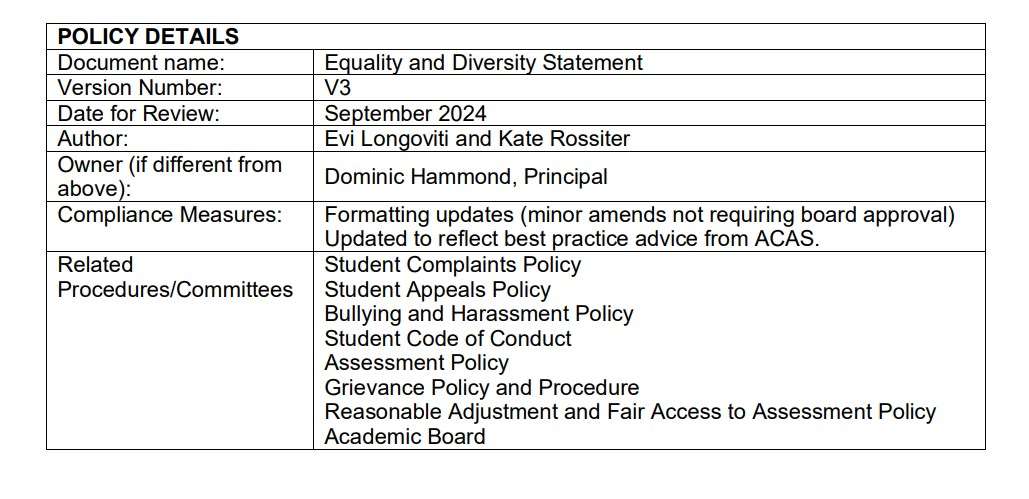1. Introduction
Equality and Diversity Statement
1. General statement
1.1 Results Consortium Ltd. (thereafter ‘The College’) is committed to encouraging equality, diversity and inclusion among our workforce, and eliminating unlawful discrimination. We treat all people with respect and consideration and value their feelings. We strive to ensure that this attitude is embodied in the way we provide our services, in our employment and recruitment practices and in the way we work with associates, students and partners. We expect everyone who works with, and for, us to support this.
1.2 The College is committed to equality of opportunity and to an inclusive approach to equality, irrespective of protected characteristics, as defined by the Equality Act 2010. The College aims to enact this in all its functions, through the development of fair and equitable policies and procedures which are consistently applied and regularly reviewed. These functions are:
• Access, recruitment, and admissions
• Assessments, retention, and progression
• Provision of student services
• Teaching, learning and quality assurance
• Community links and partnerships
1.3 Students, prospective students, staff and other stakeholders will be treated with equity, irrespective of:
• Race
• Colour
• Nationality
• Ethnic origin
• Sex
• Gender reassignment
• Sexual orientation
• Marital (including civil partnerships) or parental status
• Pregnancy and maternity
• Age
• Disability
• Religion and belief (or non-belief)
• Socio-economic class
1.4 This policy is intended to oppose and avoid all forms of unlawful discrimination. This includes in:
• pay and benefits
• terms and conditions of employment
• dealing with grievances and discipline
• dismissal
• redundancy
• leave for parents
• requests for flexible working
• selection for employment, promotion, training or other developmental opportunities
2. Our Commitments
The College commits to:
2.1 Encourage equality, diversity and inclusion in the workplace as they are good practice and make business sense.
2.2 Create a working environment free of bullying, harassment, victimisation and unlawful discrimination, promoting dignity and respect for all, and where individual differences and the contributions of all staff are recognised and valued.
2.3 This commitment includes training managers and all other employees about their rights and responsibilities under the equality and diversity policy. Responsibilities include staff conducting themselves to help the organisation provide equal opportunities in employment, and prevent bullying, harassment, victimisation and unlawful discrimination.
2.4 All staff should understand they, as well as their employer, can be held liable for acts of bullying, harassment, victimisation and unlawful discrimination, in the course of their employment, against fellow employees, customers, suppliers and the public.
2.5 Take seriously complaints of bullying, harassment, victimisation and unlawful discrimination by fellow employees, customers, suppliers, visitors, the public and any others during the organisation’s work activities.
2.6 Such acts will be dealt with as misconduct under the organisation’s grievance and/or disciplinary procedures, and appropriate action will be taken. Particularly serious complaints could amount to gross misconduct and lead to dismissal without notice.
2.7 Sexual harassment may amount to both an employment rights matter and a criminal matter, such as in sexual assault allegations. Harassment under the Protection from Harassment Act 1997 – which is not limited to circumstances where harassment relates to a protected characteristic – is a criminal offence.
2.8 Make opportunities for training, development and progress available to all staff, who will be helped and encouraged to develop their full potential, so their talents and resources can be fully utilised to maximise the efficiency of the organisation.
2.9 Make decisions concerning staff being based on merit (apart from in any necessary and limited exemptions and exceptions allowed under the Equality Act).
2.10 Review employment practices and procedures when necessary to ensure fairness, update them and the policy to take account of changes in the law
2.11 Monitor the make-up of the workforce regarding information such as age, sex, ethnic background, sexual orientation, religion or belief, and disability in encouraging equality, diversity and inclusion, and in meeting the aims and commitments set out in the equality, diversity and inclusion policy
2.12 Monitoring which includes assessing how the equality and diversity policy, and any action plans, are working in practice, reviewing them annually, and considering and taking action to address any issues.
3. Complaints
3.1 Students who believe that they have suffered discrimination can raise the matter through the Student Complaints Policy. All complaints will be investigated and treated in confidence. The College will ensure that students will not be victimised or treated unfavourably for complaining about discrimination. Advice may be obtained from Student Support Services
3.2 Any member of staff who considers that they have been treated in a way that is contrary to this statement should raise the matter with their line manager or the Principal in the first instance to reach a satisfactory resolution wherever possible. Alternatively, they could follow the College’s Grievance procedure. All complaints will be investigated and treated in confidence. Advice may be obtained from the Human Resources Manager.
3.3 If a job applicant wishes to complain about an equality issue in relation to recruitment and selection they should write to the Human Resources Manager who will arrange to have the complaint investigated.

